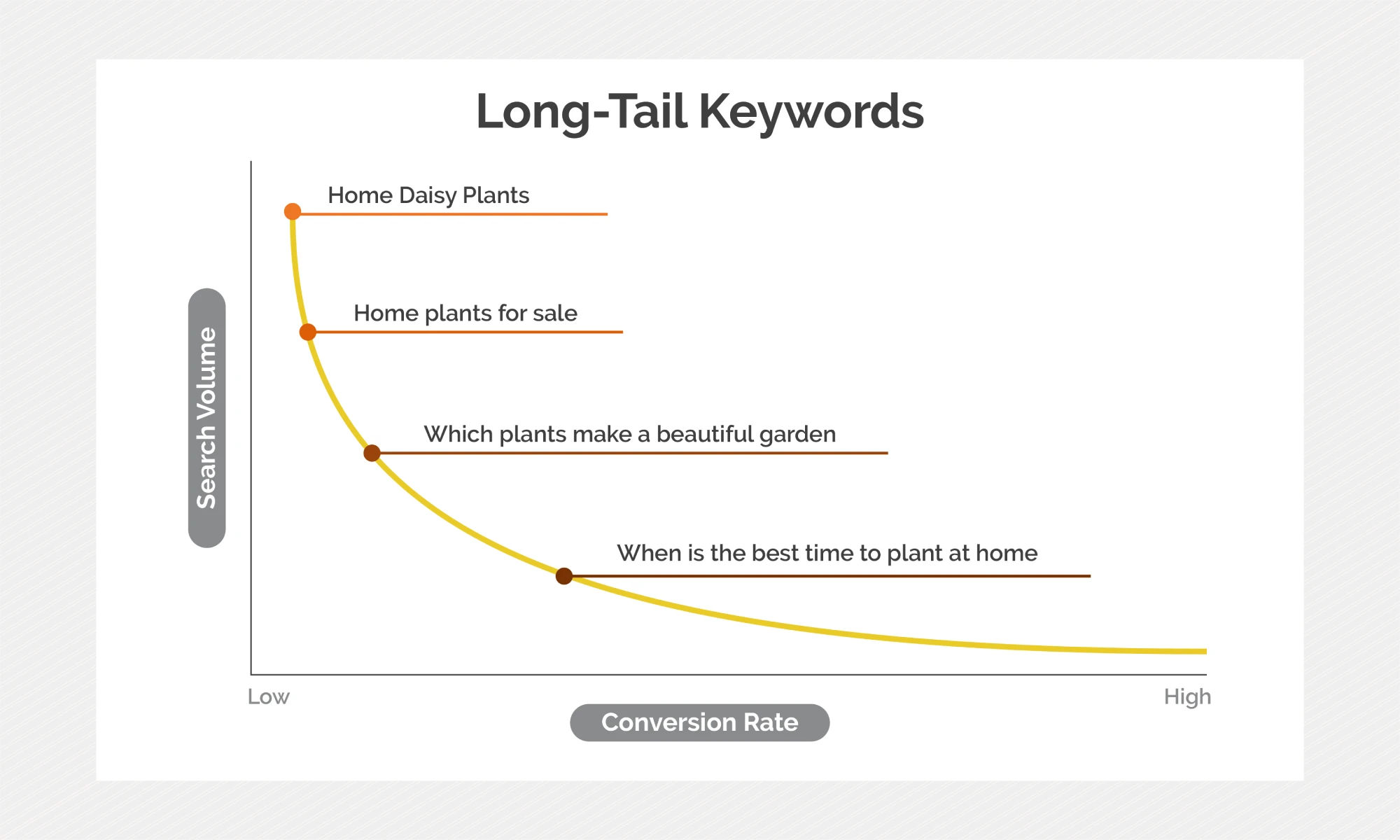Long-tailed keywords are extended and more specific keyword phrases that visitors are more likely to use when they are closer to making a purchase or when using voice search. Unlike short-tail keywords, which are broad and highly competitive, long-tailed keywords are longer, more specific, and generally have lower search volume.
For example, "digital marketing" is a short-tailed keyword, while "digital marketing strategy for small businesses" is a long-tailed keyword. The importance of long-tail keywords stems from their potential to gather highly targeted traffic and address unique user intent, resulting in higher conversion rates.
Benefits of Using Long-Tailed Keywords
Higher Search Intent and Specificity
Long-tailed keywords reflect a higher level of search intent. Users typing these phrases know exactly what they are looking for, making them more likely to convert. For example, a user searching for "best organic skincare products for sensitive skin" has a clear idea of what they need, as opposed to someone searching for "skincare."
Lower Competition and Easier Ranking
Due to their specificity, long-tailed keywords face less competition compared to short-tailed keywords. This lower competition makes it easier to rank higher in search engine results pages (SERPs), providing a significant advantage for smaller websites and new businesses trying to establish their online presence.
Increased Chances of Attracting Targeted Traffic
Long-tailed keywords attract highly targeted traffic. Visitors who arrive at your site via these keywords are more likely to be interested in your specific offerings, leading to higher engagement rates and a better return on investment (ROI) for your marketing.
Strategies for Finding Long-Tailed Keywords
Conduct Keyword Research
Effective keyword research is crucial for identifying long-tailed keywords. Start by brainstorming potential keyword phrases related to your niche, then refine them to be more specific.
Utilize Keyword Research Tools
Not sure how to find long tail keywords? Several keyword research tools can help you with this. A few we like are Moz, Ahrefs, SEMrush, Keyword.io, People Also Ask, and Google Search Console. These tools provide insights into search volume, competition, and related keywords, helping you identify the best long tail key phrases for your content.
Analyze Competitors' Keywords
Examining your competitors' keyword strategies can reveal opportunities for your own site. Identify which long-tailed keywords your competitors rank for and consider incorporating those into your content strategy.
Not sure where to start? Check out our guide to Keyword Research: 5 Next Steps.
Implementing Long-Tailed Keywords in Content
Incorporating long-tailed keywords naturally into your content titles and headings is crucial for improving relevance and search engine visibility. Ensure these keywords fit seamlessly into the context to maintain readability. This practice not only enhances the user experience but also signals to search engines the specific topics your content covers. Additionally, including long-tailed keywords in meta descriptions, meta titles, and URL structures helps search engines understand your content better and attracts users by addressing their specific queries.
Balancing keyword density and readability is essential to avoid keyword stuffing. Focus on creating high-quality, readable content with a natural flow while strategically placing your long-tailed keywords. This approach ensures that you enhance your long-form blog content while maximizing SEO benefits. By maintaining this balance, you can effectively use long-tailed keywords to boost your search engine rankings and attract more targeted traffic.
Examples of Long-Tailed Keywords
Best Practices for Optimizing Long-Tailed Keywords
-
- Choose Specific Keywords: Select keywords that are highly relevant to your content and audience. Specificity is key to attracting the right visitors and meeting their needs.
- Utilize Variations: Incorporate variations and synonyms of your primary long-tailed keywords to capture a broader range of search queries. This approach can improve your content's reach and relevance.
- Stay Up-to-Date: Keep an eye on industry trends and emerging keywords. Regularly update your keyword strategy to include new long-tailed phrases that reflect current user interests and search behaviors.
Enhance Your Quality Keyword Research Strategy
Long-tailed keywords play a crucial role in modern content marketing and SEO strategies. They offer numerous benefits, including higher search intent, lower competition, and increased chances of attracting targeted traffic. By conducting thorough keyword research, utilizing effective tools, and implementing best practices, you can optimize your content to harness the power of long-tailed keywords.
Start incorporating these specific and user-intent keywords today to see improved SEO performance and better engagement with your target audience. For expert assistance with your content marketing strategy and SEO services, contact Zero Gravity Marketing today. Check out our work to see how we've helped other businesses succeed.












